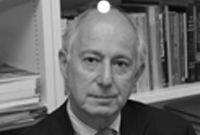Michael Cohen
Thank you to Michael Cohen for leading our brown bag session this week.
Michael Cohen thinks we need to reframe the urban question. How significant are cities? If they are significant, what do we need to do about it? In a 1991 World Bank Policy Paper, Urban Policy and Economic Development: An Agenda for the 1990s, Cohen argues that the objectives of urban policy should refocus on three co-dependent objectives:
1. How to increase the productivity of urban based economic activities
2. Exploring the link between productivity and poverty reduction
3. Integrating environmental management and sustainability
Cohen indicated that in each country of the world, at least 50% of GDP comes from cities. In more urbanized parts of the world it is closer to 80%. It follows that if so much of a country’s GDP comes from cities, then the economic future of the country depends on the productivity of cities.
This then leads to considering how to increase productivity in cities. If a city is underachieving, what are the constraints? Cohen compared the United States’, Argentina’s, and Brazil’s response to the global financial crisis to highlight how significant urban policy can be in a city’s economic outcomes.
In the United States, the stimulus package was oriented towards rural spaces, not towards urban spaces where he argues that fiscal multipliers are higher. Cohen argues that the United States stimulus failed mainly because it did not consider the spatial composition of the economy. As a result, US GDP plunged and has been very slow to recover, an "L" shaped recovery.
In Argentina, the government decided jobs were critical factors to retaining economic productivity. According to Cohen, the government gave firms employment subsidies, as much as 50% of wages, to keep workers on their payroll during the downturn so that production levels and consumption would be stable. Argentina’s GDP curve formed a “U,” recovering steadily.
Brazil infused credit into the urban economy through the Brazilian Development Bank, improved safety nets for the urban population, and put money into the economy to keep aggregate demand high. Cohen claims that the Brazilian strategy was most effective: in Brazil, GDP recovered rapidly from the financial crisis, forming a “V”.
Cohen believes the United States can learn lessons from urban-oriented fiscal policy abroad. He also feels that all countries, including the United States, need to think more carefully about the urban environments that they wish to develop. If we can agree on a framework of desirable urban outcomes, perhaps we can begin to formulate policies that shape more productive and livable cities.
Speakers

Michael Cohen is Director of International Affairs at the Milano School of International Affairs, Management, and Urban Policy and Professor of International Affairs at the New School for Public Engagement. He is an urban and development policy specialist. He worked at the World Bank from 1972 to 1999 and was responsible for much of the bank’s urban policy development during that period. Mr. Cohen has worked in 55 countries and was heavily involved in the World Bank’s work on infrastructure, environment, and sustainable development. His numerous published works include several books on urban development, Africa, and the impact of development assistance. Mr. Cohen has advised governments, NGOs, and academic institutions around the world. He recently helped the United Nations Human Settlements Programme (UN-HABITAT) prepare its 2007 Global Report on Human Settlements. He is currently the director of The New School’s Observatory on Latin America.
Please fill out the information below to receive our e-newsletter(s).
*Indicates required.
